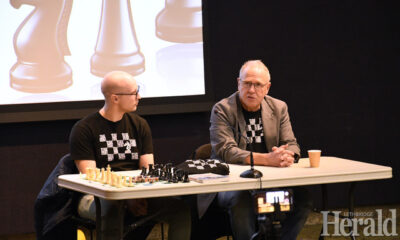Chess4Life helps youth get back in the game
By Ry Clarke - Lethbridge Herald Local Journalism Initiative Reporter on February 3, 2023.
 Herald photo by Ry Clarke
U of L student Kaileb Olson and professor Lance Grigg speak to an audience about the skills learned playing chess and the real-world applications earlier this week at the Lethbridge Public Library.
Herald photo by Ry Clarke
U of L student Kaileb Olson and professor Lance Grigg speak to an audience about the skills learned playing chess and the real-world applications earlier this week at the Lethbridge Public Library.Chess is a game of skill, with opponents facing down each other’s armies in a batte of wit and forethought.
But for a group at the University of Lethbridge, the game of chess has more strategy involved than what plays out on the board. Chess for Life is a program started by Lance Grigg, professor in the Faculty of Education, in which at-risk-youth learn about chess instead of serving community service.
Grigg and fellow team members spoke during Tuesday’s Cade Community Lecture at the Lethbridge Public Library downtown in a presentation titled “Chess for Life at the University of Lethbridge: Reflections on the Cognitive and Social Benefits of Playing Chess.”
They spoke about the work Chess for Life has done for at-risk-youth, and how the program came about.
In 2016, a youth in Lethbridge pleaded guilty to a single count of assault with a weapon and possession of a weapon, serving his time practicing basketball.
The judge, Derek Redman, noted the boy did not have a criminal record and had already spent seven days in custody. He decided to place him on probation for 12 months and ordering the youth to practice his basketball skills for at least five hours a week.
Sparked by this new take to the judicial system, Grigg wanted to explore more applications.
“This garnered a lot of attention across the country. Derek was at the university quite often and I had a chat with him. I said, ‘have you thought about chess as an alternative restorative manor of justice?’ Youth in the program could learn about chess, learn how to think before they move and exert some control,” said Grigg. “We started at the University of Lethbridge. Youth who were referred to the program for 25 hours started coming in 2017.”
Utilizing the skills learned on the board to real life, the Chess for Life program team works to help transfer those skills.
“It’s a restorative justice program that allows youth to serve their community service hours with us. They come to us, they spend roughly 25 hours learning how to play chess, while at the same time we try to tie those aspects of chess to real life,” said Jade Oldfield, grad student at the U of L and Chess for Life member. “Lance talks about space, time, and harmony, and I have really come to love that because he talks to the kids about how that applies to real life and how you have to think about using your time wisely. You have to work in harmony with other people around you to achieve that goal, as well as how that applies to their future.”
Chess may not be for everyone, but for youth in the program it has helped them make connections with personal issues in their lives. “For me, some of the youth become really good friends. The programming is led by the youth, we are not really in a position to ask them about their lives. A lot of them have sad stories to tell but we are in a position to make them feel safe. Personally, I have learned a lot about the demographics we work with,” said Kaileb Olson, a U of L student and Chess for Life member.
“We had one kid, who at the end of the program, he ended up reconnecting with family members and went to high school and started his own chess club.”
With the program helping at-risk-youth take control of their lives by application of skills learned from playing chess, Chess for Life sets the board for a second chance.
“We are always looking for volunteers, regardless of their experience in chess,” said Oldfield. “Some of the most fun I have had is on a Friday night learning from the players like Lance and Kaileb.”
15-14




